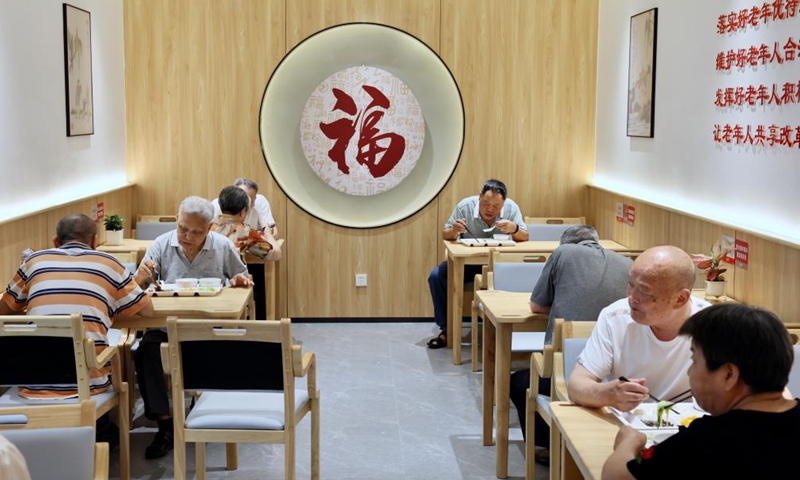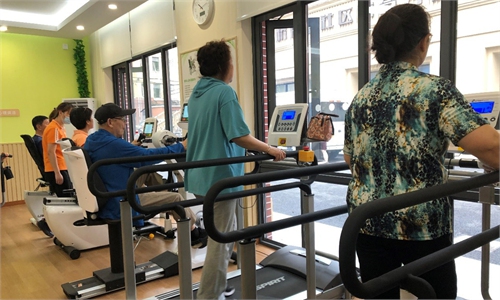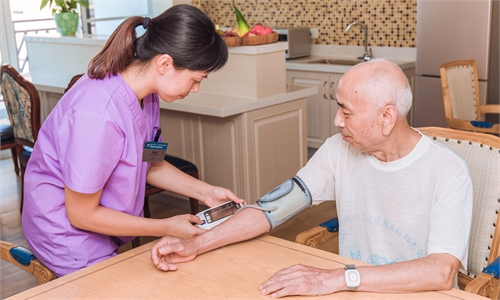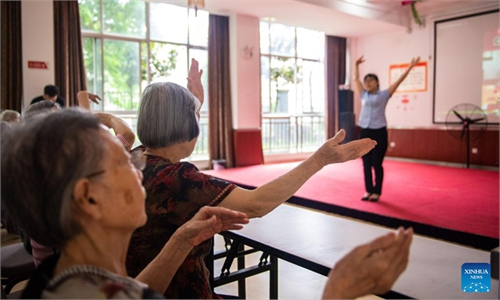
Senior citizens have meals at a canteen for elderly people at a community in Jin'an District of Fuzhou, capital of southeast China's Fujian Province. File Photo:Xinhua
The Communist Party of China Central Committee and the State Council have unveiled a guideline to deepen reforms in eldercare services, with an emphasis on integrating the latest technologies to boost service standards in the sector and maintaining a high-level opening-up to foreign investors.
The guideline, which was posted on the State Council website on Tuesday, called for the basic completion of an eldercare service network by 2029, with enhanced service capabilities, expanded capacity, improved quality and efficiency.
By 2035, the eldercare service network will be more complete, and service supply and demand will be more coordinated with all elderly people in China being able to enjoy basic eldercare service, and an eldercare service system suitable for China's national conditions will be finalized, according to the guideline.
The guideline was issued following a number of government guidelines to promote high-quality development in the sector, including a guideline on promoting the development of the "silver economy" in January in 2024.
Analysts said that the guideline, with a comprehensive approach targeting the integrated development of the sector, will help tap the growth potential of the sector as the country braces for demographic change.
Cao Heping, an economist at Peking University, told the Global Times on Tuesday that the successive rollout of related policies demonstrated that the Chinese central government has attached great importance to the healthcare sector, which is a key component of the services sector and has huge growth potential.
"Deepening reforms in eldercare service is a vital step in jump-starting the next round of growth for the world's second-largest economy," Cao said, noting that the spending by some 400 million senior citizens can effectively produce upward impetus for the economy in the years to come.
Specifically, the guideline calls for the setting up of national key sci-tech projects to promote the use of humanoid robots, brain-computer interfaces, and artificial intelligence in eldercare service, and giving full play to the market's role in allocating resources in the development of the sector. It encourages state capital to take part in the build-up. Foreign investors are also encouraged to invest in the eldercare industry and they will enjoy national treatment.
Related new and emerging industries, services and business forms, such as a fleet of humanoids assisting elders, will constitute economic growth points, Cao said.
Due to China's aging population, the "silver economy" is becoming increasingly important for China's social and economic development.
The scale of China's silver economy could reach 30 trillion yuan ($4.09 trillion) by 2035, accounting for about 10 percent of GDP, according to a government blue book published in December.
The market has drawn increasing attention from foreign companies.
In December, Chinese regulator greenlighted German investment firm Allianz Global Investors GmbH's investment in Chinese insurance firm Guomin Pension & Insurance Co.
Perennial Holdings Private Led, a Singapore-based company which is underway to open up China's first wholly foreign-owned, third-grade general hospital in North China's Tianjin Municipality, said in a statement sent to the Global Times in December that the company intends to "actively pursue opportunities to further its healthcare business in China," tapping China's largely homogenous market with a vast population as the changes in demographics accentuating the need for increased integration of medical care and eldercare services.
Tian Yun, an economist based in Beijing, told the Global Times that the guideline's calling for introducing state capital into the eldercare business will help optimizing the supply structure of the sector and lowering the prices of eldercare services.
Tian noted that it is important to set up an eldercare system that is sustainable, stay solvent and operators to strive to offer high quality service at low costs.
"We can learn from foreign expertise and combine it with China's cost and technological advantages," Tian said. "China has the potential to build a high ground of global eldercare with its cost-effective service, high level of safety, and nationwide integration. I think many foreign pensioners will be enticed to spend their old age in China."




